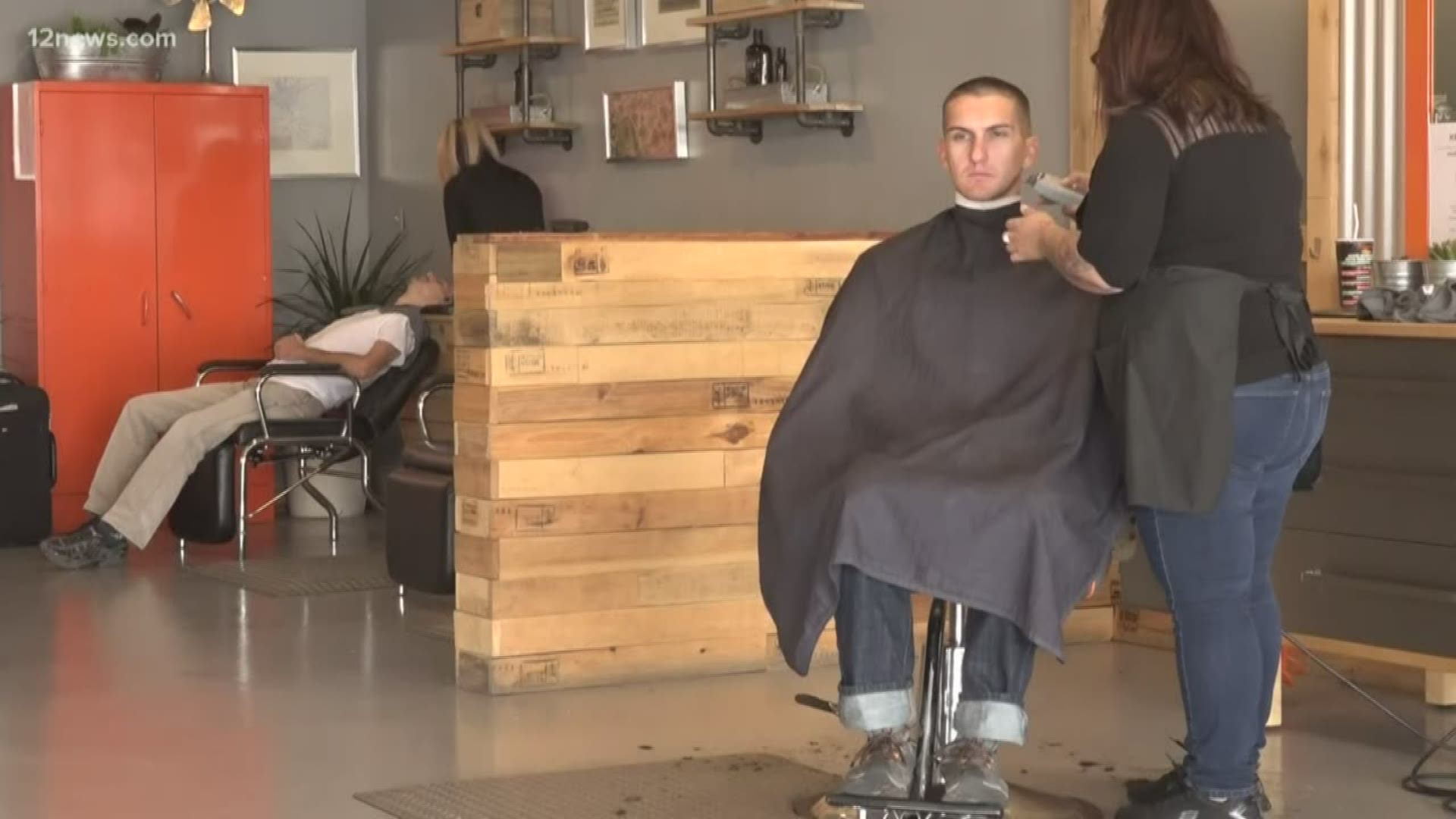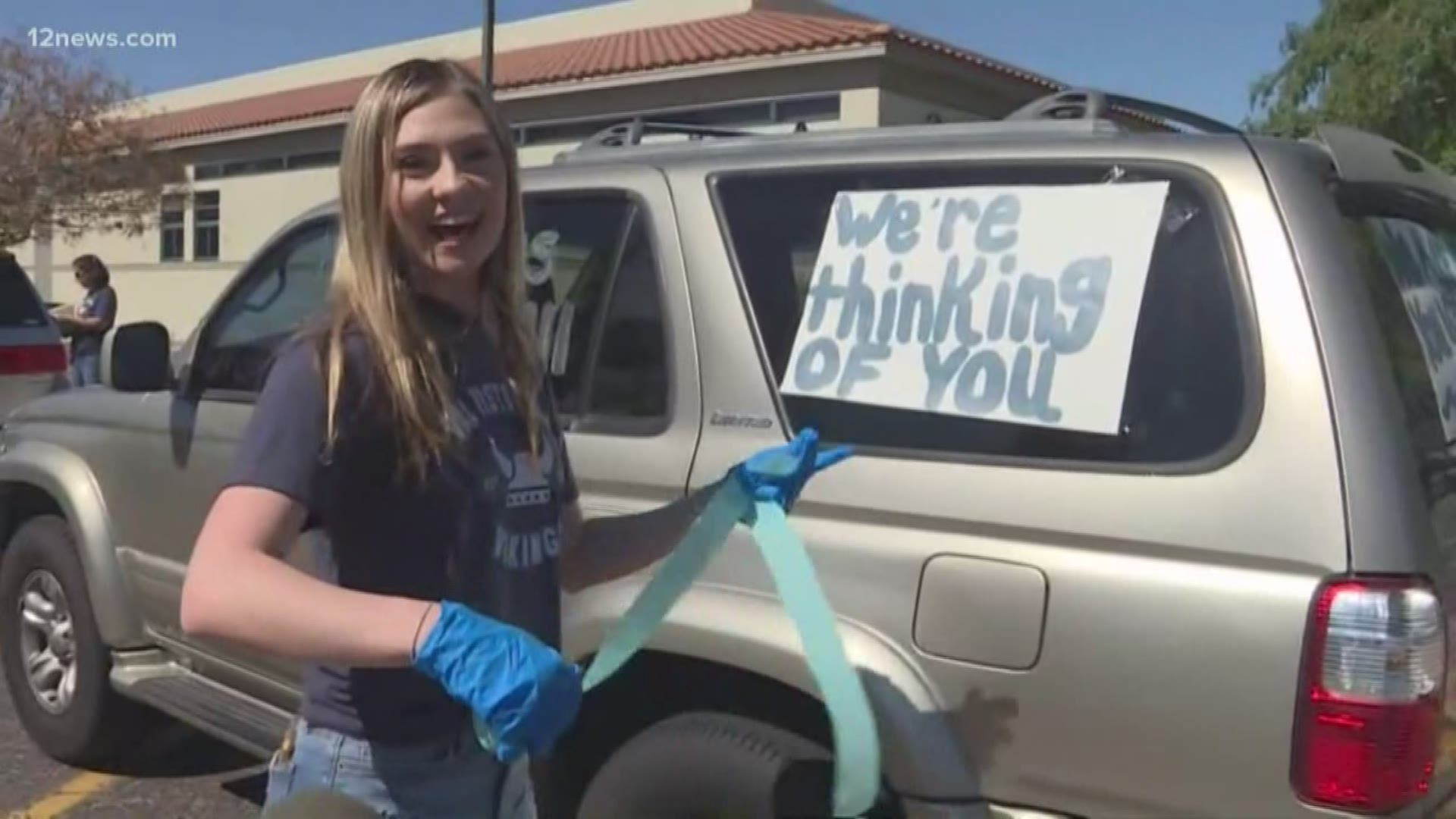PHOENIX —
Governor Doug Ducey updated his list of essential services Friday, April 3, closing salons and parts of many public parks.
These are the services that must close by 5 p.m. on April 4, 2020, if they are not closed already:
- Barbers
- Cosmetology, Hairstyling, Nail Salons and Aesthetic Salons
- Tanning Salons
- Tattoo Parlors
- Spas
- Massage Parlors
Amenities at public parks that do not allow for social distancing or proper hygiene have also been ordered to close by 5 p.m. on April 4. Those include:
- Basketball Courts
- Splash Pads
- Playgrounds
- Public Restrooms
Gov. Ducey did say that public parks will remain open "to the greatest extent possible."
Communal pools at hotels, condos, apartment complexes and parks have also been ordered to close, but they must still be maintained under the environmental and public health guidelines.
Swap meets have also been ordered to close.
But these services have been deemed essential and will be allowed to stay open:
- Personal hygiene services, such as assistance with bathing or cleaning for vulnerable adults or those with special needs
- Daycare centers that care for the children of people whose job is an essential service
- Hotels, motels and RV parks, for lodging
- Hotel and motel restaurants must provide delivery or carryout services
- Respite and palliative care
-----------------------------------------------------------------------------------------------------------
Arizona Governor Doug Ducey announced that he signed an Executive Order prohibiting the closure of "essential services" in a news conference Monday.
The order defines an essential service as one “that promotes the public health, safety and welfare of the state or assists others in fulfilling such functions."
The order keeps open jobs in five categories: Healthcare and Public Operations, Human Service Operations, Essential Infrastructure Operations, Essential Government Functions, and Essential Businesses and Operations.
The Healthcare and Public Operations category includes hospitals, clinics, dental offices, pharmacies, and public health entities. It also includes pharmaceutical, pharmacy, medical device and equipment and biotechnology companies along with blood, platelet and plasma banks, eye care centers, home healthcare service providers, mental health and substance use providers, healthcare facilities and suppliers, companies that transport and/or dispose of remains and medical materials, and veterinary offices or any company that provides health care to animals. This category includes all doctors, nurses and other medical personnel.
It also includes manufacturers, technicians, logistics and warehouse operators and distributors of any of the following products: medical equipment, personal protective equipment (PPE), medical gases, pharmaceuticals, blood, platelet and plasma products, vaccines, testing materials, lab supplies, cleaning, sanitizing, disinfection or sterilization supplies, and tissue and paper towel products.
The Healthcare and Public Operations category does not cover health clubs and gyms, which Governor Ducey ordered closed last Thursday.
The second category, Human Services Operations, includes long-term care facilities, homes and shelters for adults, seniors, children, and/or people with special needs, substance use disorders or mental illnesses, transitional facilities, home-based operations that help people with special needs, field offices to determine eligibility for food, cash assistance, medical coverage, child care vocational services, rehab centers, developmental centers, adoption agencies and any business that helps people in need with access to food, shelter or social services.
The third category, Essential Infrastructure Operations, includes food production, distribution and sale; construction, building management and maintenance, landscape management, airport operations, operation and maintenance of utilities, such as water, sewer and gas and power; distribution centers, oil and fuel refineries, roads, highways, railroads and public transportation; ports, cybersecurity companies, flood control, garbage and recycling collection and removal; along with internet, video, and telecommunications systems.
The fourth category, Essential Government Functions, includes all first responders, emergency management personnel, 911 dispatchers, court personnel, law enforcement officers, corrections officers, hazardous materials responders, child protection and child welfare workers, housing and shelter personnel, the military and state park employees that provide admission, maintenance and operation of parks.
RELATED: Tito’s Handmade ... hand sanitizer? Distillery looking to produce and give to those in need
The fifth category, Essential Businesses and Operations, is broken down into 23 subcategories. Those are:
- Stores that sell groceries and medicine
- Grocery stores
- Pharmacies
- Certified farmers' markets
- Farm and produce stands
- Supermarkets
- Convenience stores
- Food, Beverage and Agriculture
- Food and beverage manufacturing
- Farming
- Production, processing and cultivation of livestock
- Fishing
- Baking
- Cultivation, marketing and distribution of animals for consumption
- Animal shelters
- Animal rescues
- Animal kennels
- Animal adoption facilities
- Outdoor Recreation Activities (Must allow for social distancing)
- Outdoor Recreation Areas
- Parks
- Trails
- Golf Courses
- Organizations that Provide Charitable and Social Services
- Religious and Secular business and non-profits
- Food Banks
- Shelters
- Media
- Newspapers
- T.V. News stations
- Radio Stations
- Gas Stations and Businesses Needed for Transportation
- Auto-supply stores
- Auto-repair shops
- Truck stops
- Bicycle stores
- Financial Institutions
- Banks
- Currency exchanges
- Payday lenders
- Pawnbrokers
- Consumer installment lenders
- Sales finance lenders
- Credit unions
- Appraisers
- Title companies
- Financial Markets
- Trading and futures exchanges
- Companies that issue bonds
- Hardware and Supply Stores
- Critical Trades
- Plumbers
- Electricians
- Exterminators
- Cleaning and janitorial staff
- Security staff
- Operating engineers
- HVAC
- Painters
- Moving and Relocation services
- Mail, Post, Shipping, Logistics, Delivery and Pick-Up Services
- Businesses that ship and deliver food, groceries, alcoholic and non-alcoholic beverages, goods and services
- Educational Institutions
- Public and private K-12 schools
- Distance learning
- Colleges and universities
- Critical research
- Essential services
- Social distancing must be maintained
- Public and private K-12 schools
- Laundry Services
- Laundromats
- Dry cleaners
- Industrial laundry services
- Restaurants for consumption off-premises
- Supplies to Work From Home
- Stores that sell, make or supply products need to work from home or take part in distance learning
- Supplies for Essential Businesses and Operations
- Stores that sell
- Computers
- Audio and video electronics
- Household appliances
- IT and telecommunication equipment
- Hardware
- Paint
- Flat glass
- Electrical, plumbing and heating materials
- Sanitary equipment
- Personal hygiene products
- Food
- Medical and orthopedic equipment
- Photography equipment
- Diagnostics
- Food and beverages
- Chemicals
- Soaps & Detergents
- Guns & ammunition
- Stores that sell
- Transportation
- Airlines
- Taxis
- Rideshare services, such as Uber and Lyft
- Rental car companies
- Public transportation
- Home-based Care and Services for Adults, Seniors, Sids or People with Special Needs, Substance Use Disorders and/or Mental Illnesses
- Nannies
- Residential Facilities and Shelters for Adults, Seniors, Kids or People with Special Needs, Substance Use Disorders and/or Mental Illnesses
- Professional and Personal Services
- Lawyers
- Accountants
- Insurance providers
- Personal Hygiene Services
- Day Care Centers for Employees Exempted by the Executive Order
- Manufacture, Distribution and Supply Chain for Critical Products and Industries
- Pharmaceutical
- Technology
- Biotechnology
- Healthcare
- Chemicals and sanitization
- Waste pickup and disposal
- Agriculture
- Food and Beverage
- Transportation
- Energy
- Steel and steel products
- Petroleum and fuel
- Mining
- Construction
- National defense
- Communications
- Hotels and Motels
- Funeral Services
The order says that no county, city or town can close any of the services that are deemed essential by the Governor, the director of the Arizona Department of Health Services, or the Division of Emergency Management.
It also says that if a city, town or county in Arizona issues an order restricting people from leaving their homes, the order has to be discussed with the state before it is issued.
The order leaves it open for more services to be added, and the list will be updated at www.azgovernor.gov. It also says companies should encourage all employees to telework, if possible, and that all state and local agencies need to update their list of essential services to comply with this executive order.


